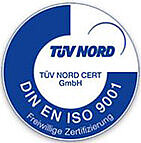General Terms and Conditions of Purchase of LOG Industrie GmbH
Table of Contents:
I. Scope, General
II. Formation of the Contract
III. Delivery Dates, Delay in Delivery
IV. Delivery
V. Delivery Documents
VI. Transfer of Risk and Default of Acceptance
VII. Prices and Terms of Payment
VIII. Retention of Title, Provisions
IX. Trade Secrets
X. Quality of the Goods / RoHS/REACH Directive
XI. Warranty
XII. Supplier Recourse
XIII. Producer Liability
XIV. Quality and Safety, Access Right
XV. Occupational Health and Safety, Environmental Protection and Hazardous Substances / “Supplier Code of Conduct”
XVI. Supply Chain
XVII. Shipment, Transfer of Risk, Export Control, Offset Provisions
XVIII. Data Protection
XIX. Statute of Limitation
XX. Written and Text Form, Severability Clause
XXI. Applicable Law and Place of Jurisdiction
I. Scope, General
(1) These General Terms and Conditions of Purchase (hereinafter “GTCPs”) shall apply to purchase contracts, contracts for labour and materials, and other supply contracts between LOG Industrie GmbH, Kiel (hereinafter “Client”) and its sellers or other suppliers (hereinafter “Supplier”). These GTCPs shall only apply if the Supplier is an entrepreneur in accordance with Section 14 of the German Civil Code (BGB), a legal entity under public law or a special fund under public law.
(2) The General Terms and Conditions (hereinafter “GTCs”) of the Supplier shall not apply if and to the extent that they obstruct or contradict these GTCPs. This shall apply even in cases where the Client does not expressly object to the GTCs of the Supplier. Exceptions shall only apply if and to the extent that the Client expressly consents to the validity of the GTCs of the Supplier.
(3) The GTCPs of the Client shall apply as a framework agreement for all future purchase contracts and contracts for labour and materials of the same type, without the need to make specific reference to the GTCPs in each individual case.
(4) References to the validity of legal provisions are made for clarification purposes. Even without such clarification, the legal provisions shall apply unless they are expressly amended or excluded in the GTCPs.
II. Formation of the Contract
(1) Orders of the Client shall only be binding if they are submitted or confirmed in text form at least.
(2) If the order contains obvious errors (e.g. miscalculations) and/or is incomplete, the Supplier shall notify the Client thereof so that it can correct or complete the offer prior to acceptance.
(3) The Supplier shall inform the Client, in text form at least, within a period of three working days whether it has accepted (hereinafter “acceptance”) or rejected the offer.
The unconditional execution of the order by the Supplier within the aforementioned period shall also be regarded as an acceptance of the offer. A delayed acceptance shall be regarded as a new offer of the Supplier.
III. Delivery Dates, Delay in Delivery
(1) Agreed delivery dates or times shall be binding. Unless otherwise agreed, the delivery date shall be 14 days from the date of contract conclusion.
(2) If the Supplier is unlikely to be able to meet delivery times, it shall inform the Client immediately.
(3) If the Supplier's delivery is delayed, in addition to further statutory entitlements, the Client shall be entitled to claim a lump-sum compensation amount for the damages caused by this delay of 0.25% of the net price per complete working day, subject to a maximum of 5% of the net price of the goods delivered late. The Client reserves the right to prove that more severe losses were incurred. The Supplier reserves the right to prove that no losses or much less severe losses were incurred.
(4) If the Supplier does not provide its service or does not do so within the agreed delivery time or if its delivery is delayed, the rights of the Client shall otherwise be determined in accordance with the statutory provisions.
IV. Delivery
(1) Goods shall be delivered free of charge to the address specified in the order. If the place of destination is not specified, the delivery shall be sent to the registered office of the Client in Kiel. The respective place of destination shall also be the place of performance for the delivery and any supplementary performance. Deviating agreements shall remain unaffected.
(2) The Supplier may only engage subcontractors to perform its obligations from a supply contract with the consent of the Client. This does not apply to forwarders, carriers and shipping providers.
(3) The Supplier shall immediately communicate signification changes in the production process, the subcontractor it engages, its sources of supply and the locations of its production facilities or those of its sources of supply.
V. Delivery Documents
(1) A Certificate of Compliance 2.1 according to DIN EN 10204 (latest version) both of the Supplier and of the manufacturer must be enclosed with every delivery, confirming that the goods delivered correspond to those listed in the order.
(2) A delivery note indicating the article number and article description of the Client, and also RoHS conformity for electronic components, must be enclosed with the delivery. The packaging of goods to be delivered and the certificate of compliance must also be labelled with this information.
(3) The customs tariff number and the country of origin must also be indicated on the delivery note, the packaging and the certificate of compliance. For goods originating from the USA, the Export Control Classification Number (ECCN) must also be specified here.
(4) Any additional documents to be issued by the Supplier as per the order must be enclosed with the delivery and indicated in advance in the order confirmation.
VI. Transfer of Risk and Default of Acceptance
(1) The Supplier shall bear the procurement risk for its services, unless otherwise agreed.
(2) The risk of accidental destruction and accidental deterioration of the goods
shall transfer to the Client upon handover at the place of fulfilment. Section 446 p. 3 BGB shall remain unaffected. If acceptance has been agreed upon, this shall govern the transfer of risk; in all other respects, the statutory provisions applicable to contracts for work and services shall apply accordingly to cases of acceptance.
(3) The statutory provisions shall apply to any default of acceptance by the Client.
However, the Supplier must also expressly offer to perform its obligation if a certain or determinable calendar time has been agreed for an action or cooperation by the Client. If the delivery concerns non-fungible goods to be manufactured by the Supplier (custom-made), the Supplier shall only be entitled to further rights extending beyond Section 304 BGB if the Client undertakes to cooperate and is responsible for the failure to cooperate.
VII. Prices and Terms of Payment
(1) The price specified in the order shall be binding. All prices listed are inclusive of statutory VAT unless this is stated separately.
(2) Unless otherwise agreed in individual cases, the price includes all services and supplementary work of the Supplier as well as additional costs (e.g. packaging, transport costs, insurance).
(3) The agreed price shall be due for payment within 30 calendar days. If the Client makes the payment within 3 calendar days, the Supplier shall grant a 3% discount on the net amount stated on the invoice, unless otherwise agreed. Payment and discount periods shall commence only upon complete delivery, receipt of a proper invoice and all delivery documents listed in Section V. In the case of bank transfers, payment shall be considered made in due time if the transfer order is received by the Client's bank before expiry of the payment term.
(4) The Client shall not owe any default interest according to Section 353 of the German Commercial Code (HGB).
(5) The statutory provisions shall apply in case of default of payment. However, the Client is said to be in default only upon issuance of a reminder in text form.
(6) The Client shall have offset and retention rights, and also a right to claim non-performance of contract, to the extent permitted by law. In particular, it shall be entitled to withhold payments due provided claims can still be asserted against the Supplier arising from incomplete or defective performance. The Supplier shall only have offset or retention rights in the event of legally established or undisputed counterclaims.
VIII. Retention of Title, Provisions
(1) The transfer of title to the Client must be unconditional and made irrespective of payment of the price.
(2) If, in individual cases, the Client accepts an offer from the Supplier under which the transfer of title is conditional upon payment of the purchase price, the Supplier's retention of title shall expire at the latest upon payment of the purchase price for the delivered goods. Even prior to payment of the purchase price, the Client shall be authorised to resell the goods in the ordinary course of business, subject to the prior assignment of the claim for payment arising from the resale (alternatively, application of ordinary retention of title with extension to resale).
(3) This excludes other forms of retention of title, in particular the extended and forwarded retention of title, as well as the retention of title extended to further processing.
(4) If the Client processes, mixes or combines the goods (hereinafter “further processing”),
the Client shall be regarded as the manufacturer and shall acquire ownership of the product at the latest upon further processing in accordance with the statutory provisions.
(5) Further processing by the Supplier of any items provided shall be carried out for the Client.
(6) The Supplier shall adequately protect any items of the Client provided against loss and destruction at its own expense and, upon termination of the supply relationship, hand over any unused items provided to the Client.
IX. Trade Secrets
(1) The Supplier shall keep confidential any trade secrets of the Supplier and its customers (hereinafter “trade secrets”), protect them against unauthorised third-party access through appropriate non-disclosure measures and undertake not to disclose them without the approval of the Client. Examples of trade secrets can include illustrations plans, drawings, production instructions, specifications, templates, samples or other items provided by the Client.
(2) The Supplier shall only use trade secrets for the purpose of fulfilling the order and shall not share them with third parties without the consent of the Client.
(3) Acts permitted by law and exceptions according to Sections 3, 5 of the Act on the Protection of Trade Secrets (German GeschGehG) shall remain unaffected.
(4) The Client shall remain the owner of the rights to the trade secrets in relation to the Supplier.
(5) This obligation to maintain confidentiality shall continue to apply even after the business relationship between the Parties has ceased.
(6) In all other cases, the Act on the Protection of Trade Secrets (GeschGehG) shall apply.
X. Quality of the Goods / RoHS/REACH Directive
(1) The product descriptions of the Client, Supplier and/or manufacturer forming the subject matter of the respective agreement or included in the agreement in the same way as these GTCPs shall in any case be deemed an agreement as to condition/quality. Examples of the above can include specifications of or references to product descriptions in the order. Electronic articles must comply with the requirements of the RoHS/REACH Directive.
(2) If there is a period of more than 24 months between the manufacture of the goods and their agreed delivery date and/or the expiry date of the goods at this time is less than 12 months, the Client shall not be required to accept the goods, unless the Client approved the delivery in text form.
XI. Warranty
(1) The statutory regulations shall apply to the rights of the Client in the case of defects of quality and title and in the case of other breaches of obligations by the Supplier, including incorrect operating manuals or instructions, unless stipulated otherwise below.
(2) Notwithstanding Section 442 para. 1 p. 2 BGB, the Client shall be entitled to claims for defects without restriction even if the defect remained unknown to it at the time of contract conclusion due to gross negligence.
(3) For the commercial duty of inspection and notification of defects according to Sections 377, 381 HGB, the statutory provisions shall apply unless stipulated otherwise below. The duty of inspection shall be limited to defects which are openly apparent during the incoming goods inspection under external appraisal including the delivery documents (e.g. transport damage, wrong delivery) or which are recognisable during random sampling procedures. If acceptance has been agreed, there shall be no obligation to inspect. The duty to notify of defects discovered later shall remain unaffected. Irrespective of the Client's duty to inspect, its complaint (notification of defects) shall in any case be deemed to be prompt and timely if it is sent within 10 days of discovery or delivery in the case of obvious defects.
(4) Subsequent performance shall also include the removal of the defective goods and their re-installation, provided that the goods have been installed in or attached to another object in accordance with their nature and intended use; the Client's legal claim to reimbursement of corresponding expenses according to Section 439 para. 2 and 3 BGB shall remain unaffected. The Supplier shall bear the expenses necessary for the purpose of inspection and subsequent performance even if it transpires that there was in fact no defect. Liability for damages in the event of unjustified requests for the removal of defects by the Client shall remain unaffected; however, in this respect, the Client shall only be liable if it has recognised or grossly negligently failed to recognise that there was no defect, or this resulted in injury to life, limb or health.
(5) If the Supplier does not fulfil its obligation of subsequent performance within a reasonable
period of time indicated, the Client may remedy the defect itself and demand from the Supplier reimbursement of the expenses required for this or a corresponding advance payment. The statutory warranty rights of the Client and X. (4) shall remain unaffected. If subsequent performance by the Supplier has failed or is unreasonable for the Client (e.g. due to particular urgency) and/or the Supplier finally and irrevocably refuses to provide subsequent performance, no setting of a deadline shall be required.
(6) In all other respects, the statutory provisions on reduction, withdrawal and compensation for damages and expenses shall apply.
XII. Supplier Recourse
(1) The Client shall be entitled to statutory rights of recourse within a supply chain according to Sections 445a, 445b BGB. In particular, the Client may demand from the Supplier the type of subsequent performance that the Client owes to its own customer in individual cases. Section 439 para. 1 BGB shall remain unaffected.
(2) The claims arising from supplier recourse shall also apply if the goods have been further processed by the Client or another company, e.g. by integration into another product.
(3) Before the Client acknowledges or fulfils a claim for defects asserted by its customer, the Client shall inform the Supplier with a brief description of the facts and request a statement in text form.
If a substantiated statement is not made within a reasonable period of time, the claim for defects actually granted by the Client shall be deemed to be owed to its customer. In this case, the Supplier shall be required to provide proof to the contrary.
XIII. Producer Liability
(1) If the Supplier is responsible for product damage, it shall indemnify the Client against third-party claims to the extent that the cause is within its sphere of control and organisation, and it is liable itself in the external relationship. Within the scope of its obligation to indemnify, the Supplier shall reimburse the Client for expenses pursuant to Sections 683, 670 BGB which arise from or in connection with a third-party claim, including recall actions carried out by the Client. Further legal claims shall remain unaffected.
(2) The Supplier shall take out and maintain product liability insurance with a lump sum coverage of at least EUR 10 million per personal injury/material damage.
XIV. Quality and Safety, Access Right
(1) The Supplier must comply with the recognised rules of technology, the safety regulations, and the agreed technical data and standards. Furthermore, it shall point out to the Client any special handling and disposal requirements, which might not be generally known, and for all goods delivered, send a manufacturer's declaration or a declaration of conformity (CE) with respect to relevant European Union directives or other legal provisions. Any changes to the deliveries or services shall require the prior written approval of the Client. The manner and nature of cooperation in the quality area, for example, first sampling and documentation, is set forth in the respective product specification.
(2) Employees authorised by the Client and the representatives of public authorities shall have access to all business premises of the Supplier in which work is carried out for the Client during regular business hours. They may inspect all applicable and order-related documents for auditing purposes or to verify legal requirements. This access right during visits shall be granted in particular to all persons authorised by the Client, who are responsible for monitoring progress of the work commissioned by the Client from the Supplier and for related audits, examinations, or for the qualification of the Supplier.
(3) Representatives of other customers of the Client shall have access to relevant business premises during regular business hours, in which customer-related work is carried out for the Client, provided that this has been agreed in advance between the Client and the Supplier, whereby approval may not be unreasonably withheld by the Supplier.
XV. Occupational Health and Safety, Environmental Protection and Hazardous Substances / “Supplier Code of Conduct”
(1) The Supplier must comply with the “Terms and Conditions of Purchase of LOG Industrie GmbH”. Upon request, the Client shall provide the Supplier with a German or English copy of the document.
(2) The Supplier must comply with the human rights and environmental expectations of the Client as well as those pertaining to corporate social responsibility. Upon request, the Client shall provide the Supplier with a German or English copy of the document. The Supplier shall contractually address the expectations along its supply chain in an appropriate manner (e.g. by anchoring equivalent standards in contracts with its suppliers). In particular with respect to human rights and environmental expectations, the Supplier shall offer and carry out training and further educational programmes, if necessary with the Client's support, in order to strengthen compliance with these expectations within its organisation. The Supplier must inform the Client in writing immediately if it expects there to be a change in the human rights and environmental risk situation within its company due to the following factors, for example (list is not exhaustive): launching new products, modifications to existing products, changes in its supply chain or opening up new business fields. The Client shall provide a complaints procedure to any person in order to draw attention to human rights and environmental risks and to violations of human rights or environmental obligations that may have arisen as a result of the business activities of the Client or its direct or indirect suppliers.
(3) If the Supplier violates the LOG Industrie Supplier Code of Conduct and/or the Terms and Conditions of Purchase of LOG Industrie GmbH regarding occupational health and safety, environmental protection and hazardous substances or if there is reasonable suspicion of such a violation, the Client may demand that the Supplier provide all information reasonably necessary to investigate and assess the case, and the Client shall have the right to check at its own reasonable discretion the relevant compliance management systems, internal audit processes and other relevant purchase processes of the Supplier. The Supplier shall cooperate as far as can be reasonably expected. In return, the Client shall respect the applicable data protection and anti-trust laws and the Supplier’s legitimate interest in treating its business secrets as confidential in an appropriate manner (e.g. by concluding suitable non-disclosure agreements and/or limiting access or blackening texts in the case of highly sensitive information). The Supplier shall further use all reasonable efforts to implement equivalent information, control and inspection rights in its contracts with suppliers from the supply chain relevant to the deliveries and services which shall also exist to the benefit of the Client.
If there is an actual breach by the Supplier as defined above, the Client shall also be entitled, after prior written notice, to suspend performance of the contract until the breach has been remedied. If the breach is non-recoverable or severe or repeated, the Client shall also be entitled to terminate the affected order with immediate effect upon written notice. These rights shall be without prejudice and in addition to any rights granted to the Client under contract or applicable law.
XVI. Supply Chain
(1) In the specific case that the Supplier or one of its suppliers in the relevant supply chain is found to be in breach of a human rights or environmental obligation according to the German Supply Chain Due Diligence Act (LkSG), the Supplier shall immediately cease and refrain from such a breach. Should the breach be of a nature that it cannot be remedied immediately or if the breach occurs in the Supplier’s supply chain, the Supplier shall be required to immediately create and implement a viable concept with a detailed timeline to end or, at least, minimise the breach. If the breach happens in the Supplier’s supply chain, the Supplier shall be further obliged to cooperate by implementing appropriate preventive measures against the breaching party (subcontractors at any level), such as implementing control measures, assisting the breaching party in the prevention and avoidance of risks, or implementing industry-specific or cross-industry initiatives which the Supplier is part of.
XVII. Shipment, Transfer of Risk, Export Control, Offset Provisions
(1) The Supplier shall package, ship and insure the deliveries properly, and comply with all relevant packaging and shipment provisions. The Supplier shall be liable for all damages suffered by the Client because of improper or insufficient packaging, shipping or insurance.
(2) Shipping papers such as e.g. delivery notes and accompanying documents shall be included with the deliveries. All documents shall state the order number, and the identification marks stipulated by the Client in the order. No later than on the day of shipping, a shipping notice shall be sent to the Client in advance by fax or email.
(3) Additional costs, which the Client incurs as a consequence of non-compliance with the above rules, shall be borne by the Supplier.
(4) For deliveries without installation or assembly, the risk shall be transferred when the goods are received at the receiving point specified by the Client.
(5) The implied acceptance set forth in Section 640 para. 1 sentence 3 BGB is excluded.
(6) The deliveries and services may, in whole or in part, be subject to national and/or foreign export control laws and regulations (= “export control laws”). The Parties hereby commit to comply at any time with the applicable export control laws and to provide to the respective other Party with all information necessary to evaluate the applicability of the export control laws. In particular, the Supplier shall identify and notify the Client accordingly of the export control laws applicable to the deliveries and services or any part thereof (= “export control classification”), at the latest upon receipt of an order. Thereafter also, the Supplier shall provide written notification to the Client about any change in the export control classification, if applicable, and/or any change in the deliveries and services affecting the export control classification, until the relevant order has been completely delivered. Upon request, the Supplier shall promptly complete and return the export control classification declaration form to the Client;
(7) If some or all of the deliveries and services are subject to export control laws, the Supplier warrants that it shall obtain, in due time and at no cost to the Client, all relevant official approvals, licences and authorisations required so that the Supplier can provide the deliveries and services to the Client and the Client or its customers can use them as specified in the Client’s end-use certificate / end-user statement. Furthermore, the Supplier warrants that the Client and its customers shall be able to use, operate, maintain, implement in their products and/or forward the deliveries and services in accordance with the export control laws and the Client’s end-use certificate / end-user statement.
(8) The Supplier shall take reasonable efforts to support the Client in the context of its international offset obligations.
XVIII. Data Protection
(1) The Parties shall respect all relevant laws and regulations on data protection, in particular those concerning the protection of personal data, over the course of their cooperation. If personal data is processed, this shall only be done if and to the extent that the processing is legally permissible.
(2) If the Supplier processes personal data on behalf of the Client and is deemed to be a processor within the meaning of Art. 4 and 28 GDPR, the Supplier shall conclude a separate and written agreement with the Client on commissioned data processing which complies with the relevant requirements relating to data protection legislation, in particular the requirements of Art. 28 GDPR. The Supplier shall not carry out any such processing until such an agreement has been concluded.
XIX. Statute of Limitation
(1) Claims arising from defects of quality and title shall lapse, notwithstanding Section 438 para. 1 no. 3 BGB, after three years from the transfer of risk. If acceptance has been agreed, the limitation period shall commence upon acceptance. Section 438 para. 1 no. 1 BGB shall remain unaffected. Furthermore, claims arising from defects of title shall under no circumstances become statute-barred as long as the third party can still assert its right against the Client.
(2) The above limitation periods shall apply to all contractual claims for defects.
If non-contractual claims for damages can also be asserted due to a defect, the regular statute of limitations shall apply to such cases, unless the application of the limitation periods under sales law results in an extended limitation period in the particular case.
(3) In all other cases, the statutory provisions shall apply to the limitation.
XX. Written and Text Form, Severability Clause
(1) Legally relevant declarations and notifications of the Supplier with regard to a contract,
e.g. setting of a deadline or reminder, must be submitted in text form. Statutory formal requirements shall remain unaffected. Where there is a reasonable doubt as to the legitimacy or authorisation of the declarant, the Client may request written proof thereof.
(2) Verbal ancillary agreements to these GTCPs and contracts between the Parties have not been concluded. If the Parties have concluded a written contract, the contractual document and these GTCPs shall be decisive for its content; the Party who invokes subsequent amendments or additions to such a contract must refute this presumption of the contractual document by providing counterevidence.
(3) If individual provisions from a contract concluded between the Parties
or from these GTCPs have not become part of the contract or are ineffective, in whole or in part, the remainder of the contract shall remain valid.
XXI. Applicable Law and Place of Jurisdiction
(1) German law shall apply to the exclusion of the UN Convention on the International Sale of Goods (CISG).
(2) If the Supplier is a merchant, a legal entity under public law or a special fund
under public law or if the Supplier does not have a general place of jurisdiction
in Germany, the exclusive place of jurisdiction for all disputes arising from or
in connection with these GTCPs and the contracts of the Parties shall be Kiel. The Client
shall also be entitled to file a suit at the general place of jurisdiction of the Supplier.
As at: 9 February 2024











